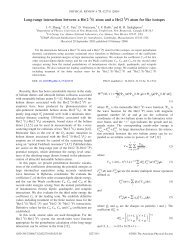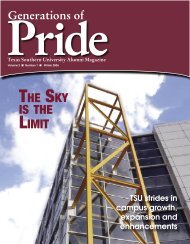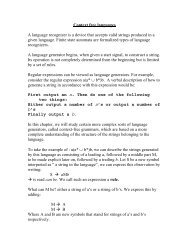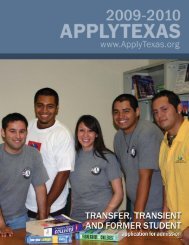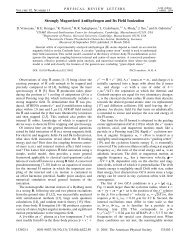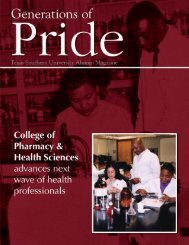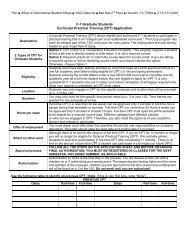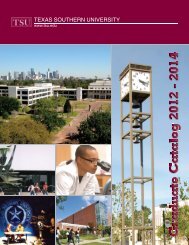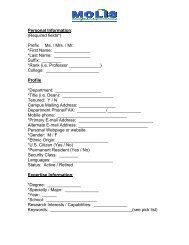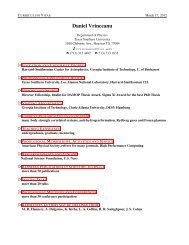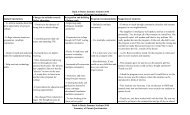2001-2003 Graduate Catalog - Texas Southern University: ::em.tsu ...
2001-2003 Graduate Catalog - Texas Southern University: ::em.tsu ...
2001-2003 Graduate Catalog - Texas Southern University: ::em.tsu ...
Create successful ePaper yourself
Turn your PDF publications into a flip-book with our unique Google optimized e-Paper software.
Each acad<strong>em</strong>ic department has faculty m<strong>em</strong>bers who serve as acad<strong>em</strong>ic advisers to graduate students. In some departmentsa graduate coordinator has been named. All graduate advisers function under the policies and regulations approved bythe <strong>Graduate</strong> Council. Department chairpersons recommend faculty for graduate status and students for assistantships andscholarships. Each department reviews applications for admission to its major degree programs and recommends studentsfor admission to the <strong>Graduate</strong> School. Final action on applications for admission is taken by the Dean of the <strong>Graduate</strong>School.FACULTYThe faculty of the <strong>Graduate</strong> School consists of persons who have been approved for graduate faculty status by the <strong>Graduate</strong>Council and includes three categories, regular, associate, and special faculty. Regular faculty m<strong>em</strong>bers are approved forfive year periods while associate faculty are approved every three years and special faculty must be approved each year.Approximately 85% of the graduate faculty hold the doctorate. Most graduate faculty m<strong>em</strong>bers have had more than fiveyears of college level teaching experience and have published scholarly books and papers in leading journals. Some areengaged in research projects supported by federal, state or private grants.STUDENTSThe student population is ethnically diverse and includes persons from most of the states in the United States. A relativelylarge corps of international students also matriculates in the <strong>Graduate</strong> School.RESEARCHThe graduate faculty is involved in a diversity of research projects funded by federal, state and private grants. Many ofthe research probl<strong>em</strong>s deal with urban and instructional issues. These research activities have resulted in publications invarious scholarly journals; some books have been written also. The <strong>Graduate</strong> School publishes documents entitled <strong>Graduate</strong>Student Research, <strong>University</strong> Research Journal, Faculty Research News, and also a newsletter, <strong>Graduate</strong> School News.Dissertations are recorded by <strong>University</strong> Microfilms International and abstracts of dissertations are published in DissertationAbstracts International. Faculty research activities are reported also through the Faculty Research Listing and FacultyResources Booklet.DEGREESThe <strong>Graduate</strong> School offers degrees at the master’s and doctoral levels. Master’s degree offerings are as follows: Master ofArts, Master of Business Administration, Master of City Planning, Master of Education, Master of Public Administration,Master of Science, Master of Science in Transportation. Doctoral degrees offered through the <strong>Graduate</strong> School consist of theDoctor of Education with concentrations in Curriculum and Instruction, Counselor Education, Educational Administration,and the Doctor of Philosophy degree in Environmental Toxicology.PROGRAMS OF STUDY<strong>Graduate</strong> students can select majors in the following acad<strong>em</strong>ic fields: in Liberal Arts, majors are offered in music, English,history, speech communication, journalism, telecommunications, human services and consumer sciences, psychology,public administration, city planning, and sociology; in Education, major programs are offered in administration and supervision,curriculum and instruction, secondary education, counseling, health and human performance; in Business, majors areoffered in accounting and general business; in Science and Technology, a graduate major is offered in biology, ch<strong>em</strong>istry,math<strong>em</strong>atics, environmental toxicology, industrial technology and transportation.The master’s degree may be earned by following either one or two plans: Plan A - with the thesis or Plan B - without thethesis. In some departments the preparation of an approved thesis is a mandatory requir<strong>em</strong>ent. The department in whichthe student is majoring should be consulted and the student should indicate which plan is to be followed at the time ofmatriculation. (See respective department programs for the details of Plan A and Plan B)The completion of an approved dissertation is required for the Doctor of Education degree and the Doctor of Philosophydegree.Each student should complete a degree plan during the first s<strong>em</strong>ester of enrollment through consultation with the chairpersonof the department.22



